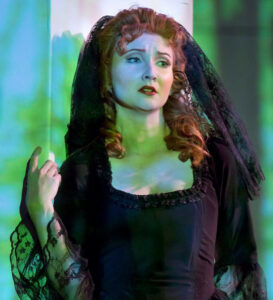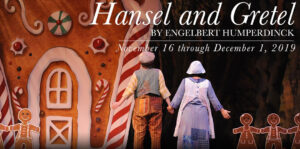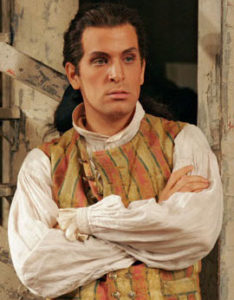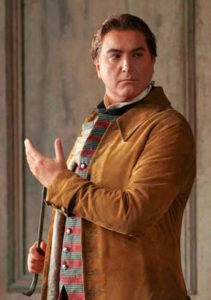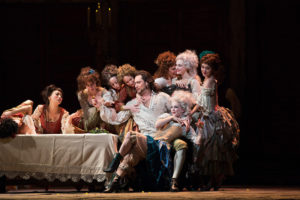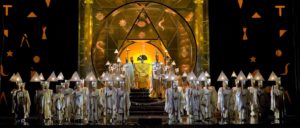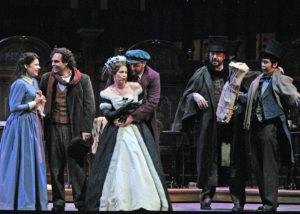For a while now, I’ve been meaning to write down my thoughts on Don Giovanni and its place in the standard repertoire in light of the #MeToo movement. But before I look at the opera as a whole, there’s one detail in it that deserves separate attention. That detail is the immortal question of Donna Anna: what happened between her and Don Giovanni at the beginning of Act I and how does she truly feel about him? Read the rest of this entry »
-
 0 Bravos & Boos (Comments)
0 Bravos & Boos (Comments) -
Cast
Hansel: Stephanie Sanchez
Gretel: Elena Galván
Witch/Mother: Kerriann Otaño Read the rest of this entry »
-
Not to be morbid, but recently I saw a discussion online comparing and contrasting the different causes of male deaths vs. female deaths in Game of Thrones. The discussion’s aim was to see how gender politics, both in-universe and in the real world, effect the ways that characters die. This inspired me to do some similar research about the myriad deaths in the standard repertoire of opera.
I looked at Operabase’s list of the 100 most frequently performed operas worldwide. Then I made a painstaking list of all the characters in those operas who die, first according to gender, then according to causes of death. Then I used a percentage calculator to fully understand the statistics. Not surprisingly, but interestingly all the same, I found that gender and gender politics do indeed strongly influence the way opera characters die – and the way audiences respond to their deaths too.
-
The opera world’s relationship with feminism is complicated. On the one hand, it constantly performs and celebrates works written by men in past centuries, which of course contain some distinctly outdated gender roles and values. On the other hand, as in the world of Shakespeare, today’s opera productions and scholarship can examine the beloved works from a feminist standpoint, sometimes critically, but at the same time celebrating proto-feminist themes, which are often surprisingly strong. Nowhere is this more evident than in modern stagings and commentary on the Mozart-Da Ponte operas, especially Le Nozze di Figaro. To many operagoers and opera scholars, Figaro’s proto-feminism is even more engaging and relevant than the themes of class conflict that made it radical in its day. Read the rest of this entry »
-
The Myers Briggs Type Indicator has been invaluable to me ever since I started exploring it. I’ve come to better understand myself, to better understand the people I know, and to fully understand before that different people think and feel in different ways. Just because my approach to life is different than other people’s doesn’t mean I’m strange or out of touch with human nature; everyone is different. MBTI has also been a fantastic tool for analyzing fictional characters, especially the characters in opera. While I’ve only written full analyses of La Bohéme and Die Zauberflöte so far, my mind has been examining the personality types of many characters from many different operas. Now I want to examine the personality types of some of the most richly characterized figures in opera: the cast of Don Giovanni. Read the rest of this entry »
-
Discovering the Myers Briggs Type Indicator has done wonders for my understanding of humankind. It’s helped me better understand myself, helped me better understand and appreciate other people’s viewpoints, and served as an outstanding tool for analyzing the fictional characters I love. Having realized by typing the main cast of La Bohéme just how enlightening it can be to apply the MBTI to opera characters, I’ve decided to use the system to analyze quite a few more operas. Beginning with my first opera, the one from which I’ve taken my screen name, and the one of which I’m currently writing a YA novel retelling (An Eternal Crown): Mozart’s Die Zauberflöte. Read the rest of this entry »
-
Of all the various subjects that fascinate me, one that’s recently caught my attention is the Myers-Briggs Type Indicator. For anyone who doesn’t know, this system of psychological analysis was developed in the 1940s by Katherine Cook Briggs and her daughter Isabel Briggs Myers, based on the theories of Carl Jung. It proposes that there are sixteen different psychological “types”, based on four preferences: “Extraversion (E) vs. Introversion (I),” “Intuition (N) vs. Sensing (S),” “Thinking (T) vs. Feeling (F),” and “Judging (J) vs. Perceiving (P).” According to theory, every person chiefly operates by a certain combination of these factors, which determine the way in which that person comprehends the world.




